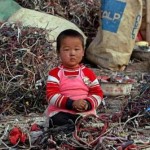Being Pro-Life to me means going beyond saving the unborn babies. It also means having compassion for criminals (which means no death penalty), making sure that single mothers find work, education, supplies, and babysitters so that they can take care of their children, and caring for the terminally ill (no euthanasia). In Laudato Si, Pope Francis, in this encyclical, takes the idea of being pro-life and puts it on a global scale.
Part 5 of Chapter 1 talks about the quality of life, or lack thereof as the case may be. He acknowledges that there is a connection between the quality of life in terms of the environment and quality of life in terms of how well people are living. Unfortunately, not many people who have the power to influence the quality of life are choosing to do so outside of keeping up appearances.
Paragraph 50 particularly stands out here to the liberals who are dancing on tables about the Pope apparently agreeing with the party line. (Emphasis mine)
Instead of resolving the problems of the poor and thinking of how the world can be different, some can only propose a reduction in the birth rate. At times, developing countries face forms of international pressure which make economic assistance contingent on certain policies of “reproductive health”. Yet “while it is true that an unequal distribution of the population and of available resources creates obstacles to development and a sustainable use of the environment, it must nonetheless be recognized that demographic growth is fully compatible with an integral and shared development”. To blame population growth instead of extreme and selective consumerism on the part of some, is one way of refusing to face the issues. It is an attempt to legitimize the present model of distribution, where a minority believes that it has the right to consume in a way which can never be universalized, since the planet could not even contain the waste products of such consumption. Besides, we know that approximately a third of all food produced is discarded, and “whenever food is thrown out it is as if it were stolen from the table of the poor”. Still, attention needs to be paid to imbalances in population density, on both national and global levels, since a rise in consumption would lead to complex regional situations, as a result of the interplay between problems linked to environmental pollution, transport, waste treatment, loss of resources and quality of life.
Overpopulation Myth Believers, consider yourselves hosed.
Part 6 of Chapter 1 looks into the lack of response and effort people have taken in trying to make the environment better. In his opinion, people in power see the environment as part of their agenda and wars could eventually break out over lack of resources under the guise of being for the greater good. There are positive examples of good change in the world. It’s not much, but it’s a start. However, Pope Francis warns against sitting on our laurels.
Standout quotes
Paragraph 53
Yet we are called to be instruments of God our Father, so that our planet might be what he desired when he created it and correspond with his plan for peace, beauty and fullness.
Paragraph 54
There are too many special interests, and economic interests easily end up trumping the common good and manipulating information so that their own plans will not be affected.
Paragraph 59:
Superficially, apart from a few obvious signs of pollution and deterioration, things do not look that serious, and the planet could continue as it is for some time. Such evasiveness serves as a licence to carrying on with our present lifestyles and models of production and consumption. This is the way human beings contrive to feed their self-destructive vices: trying not to see them, trying not to acknowledge them, delaying the important decisions and pretending that nothing will happen.
Part 7 is entitled “A Variety of Opinions,” which looks into the differing POVs on the issue of the environment and asks for genuine dialogue in order to find solutions.
Standout quote:
Paragraph 60:
At one extreme, we find those who doggedly uphold the myth of progress and tell us that ecological problems will solve themselves simply with the application of new technology and without any need for ethical considerations or deep change. At the other extreme are those who view men and women and all their interventions as no more than a threat, jeopardizing the global ecosystem, and consequently the presence of human beings on the planet should be reduced and all forms of intervention prohibited.

















